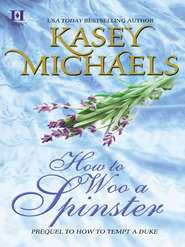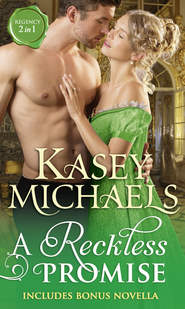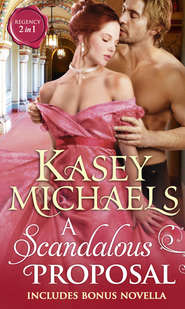По всем вопросам обращайтесь на: info@litportal.ru
(©) 2003-2025.
✖
How to Tame a Lady
Настройки чтения
Размер шрифта
Высота строк
Поля
She was astonishingly beautiful. She was astoundingly forward and impertinent.
She possessed the most kissable mouth he’d ever seen. And clearly she knew that, or else why would she have affected that quick, enticing bite of her full bottom lip, if not to drive a man insane?
She was also a distraction. With what Lord Frayne had just asked of him, with the information the man had just that morning dangled in front of him so unexpectedly, did he need a distraction at this moment in his life?
No. No, he did not.
CHAPTER TWO
NICOLE TOOK HER TIME combing through her thick black hair, carefully working out a few tangles caused by having it all anchored up and off her neck. She could allow her new maid, the estimable Renée, the chore. But, since Renée seemed to be of the opinion that a woman should suffer for her beauty, Nicole had set her to pressing the hem of her peach gown instead.
Looking into the mirror of her dressing table, she studied her sister as Lydia sat in a slipper chair, her head buried in a book. There was nothing unusual about that. Depressing, certainly, as they were in the middle of the most exciting city on earth, but most definitely not unusual.
Nicole loved her twin more than she did anyone else in the world, but this past year had been very difficult. And so terribly sad.
When their brother, Rafe, had returned from the war to take over the reins of the dukedom, he had brought with him his good friend Captain Swain Fitzgerald.
And Lydia, quiet, levelheaded, studious Lydia, had tumbled head over heels into love with the man, only to lose him when Bonaparte escaped his prison and forced one last battle on the Allies.
Even now, Nicole could see occasional hints of sadness in her sister’s huge blue eyes during quiet moments.
Some might argue that Lydia, at seventeen, had been too young to really know her own mind, and that Captain Fitzgerald had been years too old for her. But Nicole would never say any such thing. Not when she’d held her sister in her grief, fearful that Lydia’s very heart would break inside her and she’d lose her best friend, the other half of herself.
That terrible day, when the Duke of Malvern had come to this very house to inform them all of the captain’s death, Nicole had promised herself that she would never open herself to such devastating heartbreak. Life was to be enjoyed, gloried in, celebrated. Allowing one’s happiness to depend on someone else was to invite not only a chaotic mind but a vulnerability to pain that Nicole refused to consider.
No, Nicole would never allow anyone else, any man, to have so much power over her, and had stated that fact quite firmly to both her sister and her sister-in-law, Charlotte.
And they had only smiled indulgently. After all, what was a young lady of Nicole’s station to do but marry? As a sister to a duke, her options were limited, if, to many, all quite wonderful. A husband. Children. She would be mistress of a grand estate, an arbiter of fashion, become a successful and sought-after hostess. It wasn’t as if she could take to the high seas, or fight in wars or sit in Parliament…not that Nicole wished to do any of those things, either.
In truth, she didn’t know what she wanted to do with her life or what she wanted out of that life.
She only knew what she didn’t want.
Mostly, she didn’t want to be desperate, like her mother. Mostly, she didn’t want to be heartbroken, like her sister.
Mostly, she wanted to be left to her own devices so that she could someday answer that question as to what she wanted out of life. And in the meantime, if she thought the idea of some harmless flirtation and exercising of her charms to be a delicious entertainment, surely that wasn’t so terrible?
She loved her family, desperately. She needed no one else. Although not the prodigious student her sister was, Nicole had not been above quoting Francis Bacon to Lydia. “He that hath wife and children hath given hostages to fortune; for they are impediments to great enterprises, either of virtue or mischief.”
Yes, Lydia had reasonably pointed out that Nicole was not a man (which often chafed Nicole, as she believed men enjoyed much more freedom than women), and that she, Lydia, had never suspected that Nicole had aspirations to great virtuous enterprises. To her sister’s already known propensity for mischievous enterprises, Lydia’s response was only to roll her eyes and sigh in affectionate resignation.
They were so different, she and Lydia. Her sister obeyed the rules, accepted her place in the world, caused not a smidgeon of trouble to anyone, while Nicole strained against every leash, saw every rule as a challenge and, although never purposely, had occasionally caused more than her sister to breathe resigned sighs.
Nicole and Lydia had settled into their very different roles early in life, and Nicole realized now that she had allowed herself to become comfortable with always knowing her sister was dependable if sometimes boring, clearheaded if perhaps too intense, and always a model of propriety.
Which did not explain what had happened earlier that day.
“Lydia?”
“In a moment, please, Nicole,” her sister said as she turned a page in her book and continued to read for several moments before closing the book over her finger. “I’m just reading the most interesting and rather bizarre argument.”
“That’s nice, Lydia. Then I take it you are not still reading Miss Austen’s latest inspired bit of silliness?”
Lydia shook her head. “I finished that yesterday. Today is for something Captain Fitzgerald recommended to me, written by one Thomas Paine. This volume is called The Rights of Man and—well, listen to this.”
It was Nicole’s turn to sigh in resignation. “If it sounds anything like a sermon, please don’t bother.”
“No, no, I just want to read you this one thing Mr. Paine wrote. Here it is. He states quite firmly how necessary it is at all times to watch against the attempted encroachment of power, and to prevent its running to excess. Shall I read you his exact words?”
Nicole bit back a smile. “No, I think I understand his point. Lydia, far be it from me to declare myself a scholar, but you do realize that your Mr. Paine could be thought by some to be fomenting revolution and the overthrowing of governments, don’t you?”
“I choose to think he is only warning us to always remain vigilant,” her sister said, closing the book once more. “But I suppose you could be right. That’s what America did to us, and France did to its king.”
Nicole put down her comb. “Nobody is going to do that here, if that’s what this is all about. We have a good king.”
“Do we, Nicole? Then why did I find this in my maid’s apron pocket when I went searching for the button she promised to sew back onto my blue pelisse? Which is why I’m reading Mr. Paine’s warnings.”
So saying, Lydia took a much-folded broadsheet from her own pocket and handed it to Nicole, who first looked to her sister, and then to the poorly printed call for everyone to join the “Citizens for Justice” and to “take up arms against an oppressive government determin’d to starve our children and screw honest men into the ground.”
She quickly read the rest, and could see why Lydia might be alarmed. “And you found this in your maid’s apron?”
Lydia nodded. “I’m going to show it to Rafe tomorrow. He may know what it all means. Revolution is terrible, Nicole, even when it is necessary. And it isn’t all that far-fetched, you know. It happened here.”
“I remember from our lessons, yes,” Nicole said, more concerned by the broadsheet than she’d allow Lydia to see. “But do you really think that—”
“Oh. Oh, no, I suppose not. Not when I say it all out loud. And I know you’re not interested, in any event. I…I wish Captain Fitzgerald could be here. He’d know just what to say to me.”
Nicole winced inwardly. “I didn’t say I wasn’t interested, Lydia. Or do you think I’m selfish, and care only for myself? That I couldn’t be concerned about oppressed classes or whoever it is who raise these revolutions? Because that’s not fair, Lydia, it really isn’t.”
Her sister was quick to agree, perhaps too quick to agree, and Nicole wondered if everyone saw her as shallow and more concerned with enjoying herself than she was with anything or anyone else. Was that the price a person had to pay for preferring a life without complications? Besides, was selfishness really a crime, if you were only selfish about protecting yourself?
Yes, she supposed many would see it that way. The conclusion didn’t sit well with her.
“Nicole? Don’t pout. I didn’t mean to say you aren’t the best of sisters, humoring me when I turn bluestocking, as Mama calls it each time she sees me with a book. If it were up to her, neither of us would have any conversation above commenting on the weather, as if anyone could say more than that they wished the rain would go away and the sun come back.”
Delighted to have any awkwardness passed over so easily, Nicole changed the subject—to the one she’d attempted to broach a full ten minutes earlier. “What made you invite the marquess and the viscount to dinner tonight, Lydia? Not that I wasn’t delighted down to my toes, but it was so unlike you.”
Lydia got to her feet after glancing at the mantel clock and seeing the hour. “Yes, it was, wasn’t it? I have no idea why I did that. Except that I believed I could sense that you wished to see the marquess again. It was no secret that he wishes to see you again. There’s never been a man who has seen you and not longed for more.”
“More what, Lydia?” Nicole teased, although inwardly, her stomach was doing a series of small flips. “So you saw it, too? The marquess’s interest, that is?”
“I did, the poor flustered Viscount Yalding did. You did, and then purposely set out to torment the man.”
Had she done that? Nicole didn’t wish to admit it, but she could barely recall a word she’d said to the marquess. She’d been much too busy simply looking at him.
“Do you plan his to be the first heart you break while we’re here?”
Nicole slipped her hands beneath her hair and lifted it up from her nape, piling it all on top of her head for a moment before allowing the heavy mass of waves to fall once more, shaking her head so that it tumbled free all around her face and shoulders. With any luck, Lydia would watch the gesture, and not pay attention to the flash of uncertainty her words had undoubtedly sent into her sister’s eyes. She had been doing her best all afternoon to not think about the Marquess of Basingstoke and his unexpected effect on her.











